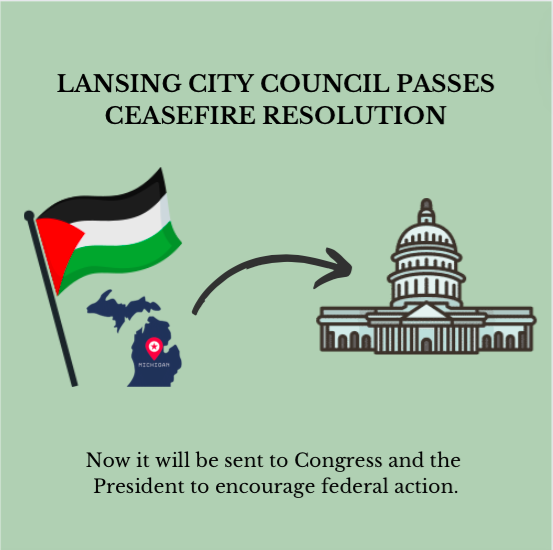The Lansing City Council unanimously approved a resolution in support of a ceasefire in Gaza and Israel on Feb. 12. Councilmembers voted on the resolution without discussion, following a reading of the document, which was drafted by Lansing’s Committee on Equity, Diversity and Inclusion.
Following the 7-0 vote was more than an hour of public comment from over 40 individuals. The outpour of passion from the community put the meeting room at full capacity, forcing several people to watch the decision from a separate location in City Hall.
“At first I didn’t really support it because I didn’t see that war in Gaza was City of Lansing business, but after hearing from so many residents, who convinced me otherwise, I thought it was the best thing to do to support it because too many people are dying and what’s happening over there is horrific,” Councilmember Brian Jackson said.
Jackson explained that residents tried to voice their support for a ceasefire resolution at Congressional levels, but they were not heard. Instead, they came to local government officials in the hopes of achieving legislative action.
“[Lansing has] always been a place where refugees come and are welcomed,” Jackson said. “I think by passing a ceasefire resolution, it just shows the community that we stand for peace.”
After its passage, the ceasefire resolution was sent to the President of the United States and Congress on Michigan’s behalf. Many states and cities across the country have sent similar resolutions to the higher levels of government in hopes of federal action.
“The U.S Government holds great diplomatic power that could save Palestinian and Israeli lives and the City of Lansing urges officials to prioritize the preservation of life,” the resolution says.
The document states that the City of Lansing is committed to the idea that all human life is precious around the world “regardless of national, ethnic, political, or religious affiliations,” and calls for an immediate and lasting ceasefire in Gaza to prevent more loss of human life.
“I hope that it is just one more piece of support for a ceasefire that could make it to President Biden or Congress’s desk, and then it’ll just be one more piece of pressure to try to act diplomatically,” Jackson explained.
